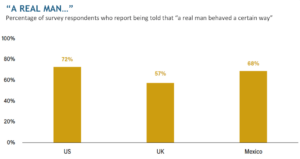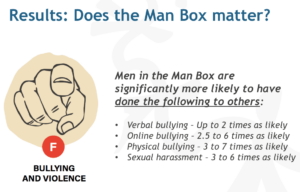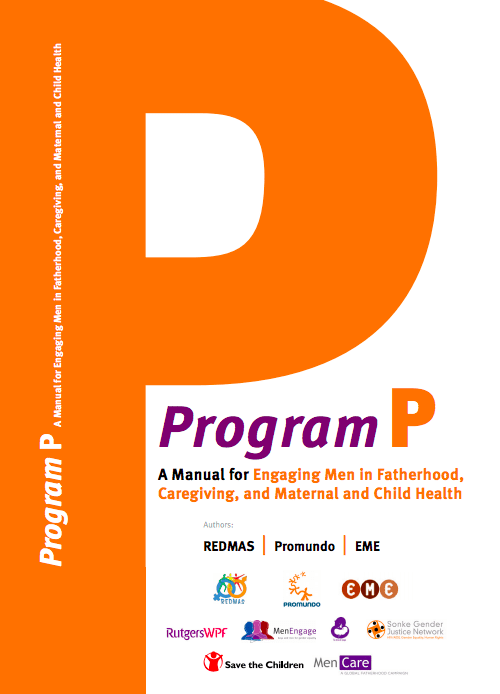By: Kalin Goble, MS
In our most recent OneOp webinar training, “Engaging Military Fathers to Model Healthy Relationships for Their Children: Lessons from Promundo’s Global Work with Dads,” we were joined by Jane Kato-Wallace of Promundo to discuss social, personal, and professional expectations of masculinity.
In this session, she explored the link between perceived “manhood,” and the characteristics boys and men believe they must embody to be a “real man” in today’s society. Jane also provided recommendations on applying this information in work with military fathers.
Promundo’s global work challenging societal expectations of manhood…
Traditional ideals of masculinity shape young boys’ perceptions of what it means to be a man. These ideals shape the lives of boys and men. They also have bigger impacts, in girls’ and women’s lives, and in men’s relationships with their families, their friends and colleagues, and their communities.
Men often feel pressure based on strict social notions of what it means to “be a man.” Many of the participants in our live session noted boys are taught from an early age that properly performing manhood means being tough, not showing emotions, being physically strong, being the “breadwinner,” and taking assertive actions. Promundo’s “The Man Box” Study surveyed men ages 18 to 30 in the US, UK, and Mexico to capture young men’s attitudes toward expectations of manhood and the consequences that correlate with their belief of needing to perform manhood a certain way.
Some of the key findings covered in this study:
- The majority of younger men (ages 18 to 30) in the general population believe society has a specific idea and definition of manhood. Of the men surveyed in the US, 72% reported that they have been told: “a real man behaves a certain way.”
- Prevalent societal standards of masculinity impact boys as they develop into adulthood. Promundo’s “man box” designated seven characteristics as “pillars of manhood.” These “pillars” of social expectations are for men to:
- Be self-sufficient
- Act tough
- Be physically attractive
- Take on rigid masculine gender roles, such as being the “breadwinner”
- Embrace heterosexuality as “norm” and challenging homophobia, and the difficulty for men and boys to be themselves, especially for LGBTQ+
- Hypersexuality
- Asserting aggression and control.
- The more respondents agreed to statements based on these “pillars,” the more “in the man box” they were. Men that challenge traditional ideas of masculinity often face alienation, social stigma, and isolation. The “man box” reinforces the expectations of manhood and highlights the negative outcomes when individuals are not performing in socially expected ways.
- Young men who most agree with rigid notions were much more likely to commit acts of bullying, domestic, and family violence. Men in the “man box” were more likely to have been verbally bullied, online bullied, physically bullied, and/or sexually harassed someone.
- Instead of reinforcing traditional messages of what it means to be a “real man,” we should challenge these norms and beliefs by promoting general ideals that “everyone should” strive for, such as emotional strength, open-communication, and equality among genders, and expectations of roles.
Promoting the active engagement of military dads and the challenges and rewards of navigating that…
As service providers working within military settings, there are unique challenges faced by those you are supporting. Balancing expectations of personal and professional life are often the tough reality for military fathers and their partners. Promoting positive messages, working to meet men where they are, and acknowledging the high demands of military fatherhood are important.
There are many actions you can take to promote your services. The personal schedules of military service members are often difficult to manage due to the high demands of professional scheduling. Working to schedule services at convenient times like during lunch or in the late afternoon may work best for getting men engaged. Keeping your services needs-focused engages men to be part of the solution. Working with a variety of dads in the community to question the social expectations of manhood can create effective, long-term change.
Additional tips for service providers to use in their work with fathers and families…
- Take a free course covering a foundational understanding of gender, like the Gender 101: Gender Equality course offered by the USAID Learning Lab.
- Download Promundo’s Program P: A Manual for Engaging Men in Fatherhood, Caregiving, Maternal, and Child Health. This free manual is trauma-informed. It includes session outlines, exercises, activities, discussion questions, and other content for healthcare providers to use in their work with fathers and groups of dads. Practitioners can use this manual as a guide and adapt the information provided to fit their settings.
- Begin by creating a small group of men. For the first step in implementing father-oriented support programs, begin with a select few fathers. This will allow you to go through the sessions with them, create space for discussion and input, and get feedback before moving to larger groups. Grow the programs and trainings as you continue to conduct sessions with fathers and families.
This webinar took an in-depth dive into Promundo’s research, the link between fatherhood, masculinity, and the impact on families. As you work to infuse evidence-informed strategies in your work with men and fathers, this training offers some foundational information and tips for best practices to work with men to challenge societal norms and pressures. By working together to deconstruct harmful notions of manhood, fathers and families alike begin to celebrate the diversity and of what it truly means to be a man and an involved partner, father, friend, and colleague.
Archived Viewing and CE Credit Info
If you missed the live webinar session, an archived recording of the full session and additional resources are available on the event page here. Free continuing education credits for this event are still available for licensed social workers, professional counselors, case managers, certified family life educators, and family therapists. These CE credits will be available to obtain through July 7th, 2022.
Blog Post Image:Flickr/The National Guard/Public Domain


















